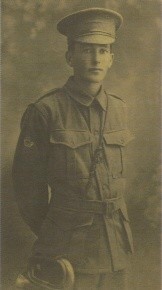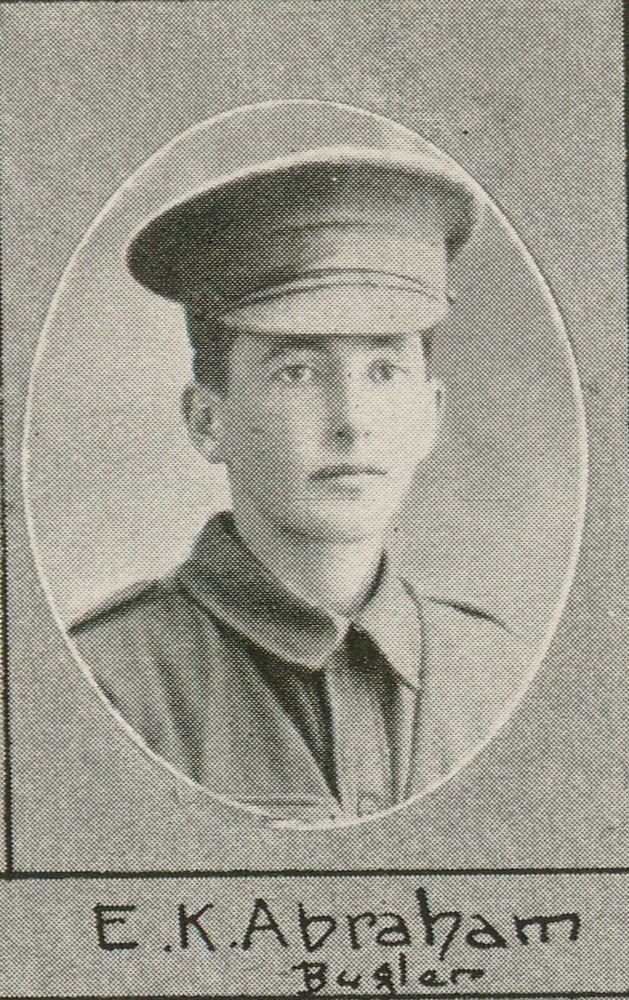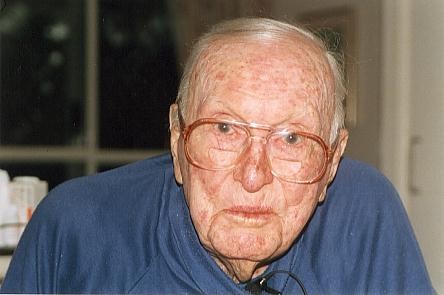Eric Abraham, 25th Infantry Battalion: oral history
By JOL Admin | 23 November 2017
Guest blogger: Suzanne Mulligan, Oral History Queensland Inc.
Eric Abraham was a World War I veteran whom it was my privilege to meet in 2002. I graduated from University of Queensland in 2001 with a major in Journalism and had attended an oral history workshop run by Oral History Queensland. Armed with my new skills, I wanted my first oral history interviewee to be a World War I veteran.

Eric Abraham in his First World War uniform. Image supplied by S. Mulligan
I was born on Anzac Day so always had a holiday on my birthday. I grew up with a great interest in World War I, especially the Gallipoli landing. On the wall in my small primary school there was a large painting of that landing. I would sit and stare at that painting fascinated by the soldiers shown in different stages of leaving their boats and running through the water to the beach. There were bursts of gunfire, explosions and soldiers falling. How could these men do what they did?
As an adult, I learned more about World War I, reading all the books I could on the subject. I became horrifically aware of the sacrifices of the soldiers at Gallipoli and the Western Front. Now our country is “reliving” these terrible times as we commemorate the centenary of that conflict. There were so many family tragedies, so many wasted lives with their names listed in our newspapers. The more I learned, the more I understood that these young men had their lives cut short, often in questionable circumstances. Even those who survived were often severely damaged physically, mentally or both.

E.K. Abraham in The Queenslander Pictorial supplement 1916
Eric Abraham survived the Great War though two of his brothers did not. He described the conditions on the Western Front as “ghastly”, saying this was not a strong enough word. He said, “It was terrible - the conditions under which we fought – mud up to the ankles - all over the place – mud, mud, mud – how the hell I survived, I’ll never know – God was looking after me – because my chest is susceptible to all sorts of complaints which I received from service on the Somme in the mud – and in the mud up at Ypres – ghastly place. Yet here I am 104 in three weeks’ time.”
I found Eric Abraham a cheerful man and his memory seemed clear despite his great age. He told of witnessing the downing of the Red Baron, a German flyer. “It was morning – the yell went up “The Red Baron’s up”. He was flying his red aeroplane – we called him the Red Baron – I don’t know if he was a Baron or not. He was the bloke who drove this red aeroplane and he was a damn good aeronaut, this bloke. And he was chasing his 81st kill – he killed 80 of our blokes – 80 planes – there’d be two people in the plane in those days. Anyhow he was chasing his 81st in the morning period 10 or 11 o’clock. “The Red Baron’s up” we went and had a look-see at the Red Baron. The Red Baron was chasing one of our blokes, weaving up and down right in front of us – grandstand view of this when all of a sudden a bloke came out of the sky latched on to the Red Baron’s tail – dededede – he hadn’t the faintest idea, the Red Baron hadn’t the faintest idea that there was anybody on his tail. He came out of the sky 21st April 1918. That’s the story of the Red Baron.”

Eric Abraham in 2002. Image supplied by S. Mulligan
When World War II broke out, Eric was very disappointed. “I thought “we’ll never learn” – that’s how it affected me “we’ll never learn”. We’ve been having wars for years. I was a thinker. I thought how the bloody hell – war after war after war, why can’t they just settle some of the differences they had - it made no difference. I didn’t understand it. We’ll have another war – you’ll see – we’ll have some more wars.”
Editor's note
Suzanne Mulligan, long-standing member of the Oral History Queensland Inc., a branch of Oral History Australia, has recently donated her oral histories collection to the State Library of Queensland. Eric's oral history and many others are now part of the 31267 Suzanne Mulligan Oral Histories Archive 2002-2017. Digital versions of the oral histories will soon be available via the finding aid for this collection, and they can also be found on YouTube, via Suzanne's own blog.
References
Landing at Anzac, April 25, 1915 by Charles Dixon. New Zealand History: Nga korero a ipurangi o Aotearoa
31267 Suzanne Mulligan Oral Histories Archive 2002-2017
Mulligan, S. Oral history interviews
Comments
Your email address will not be published.
We welcome relevant, respectful comments.